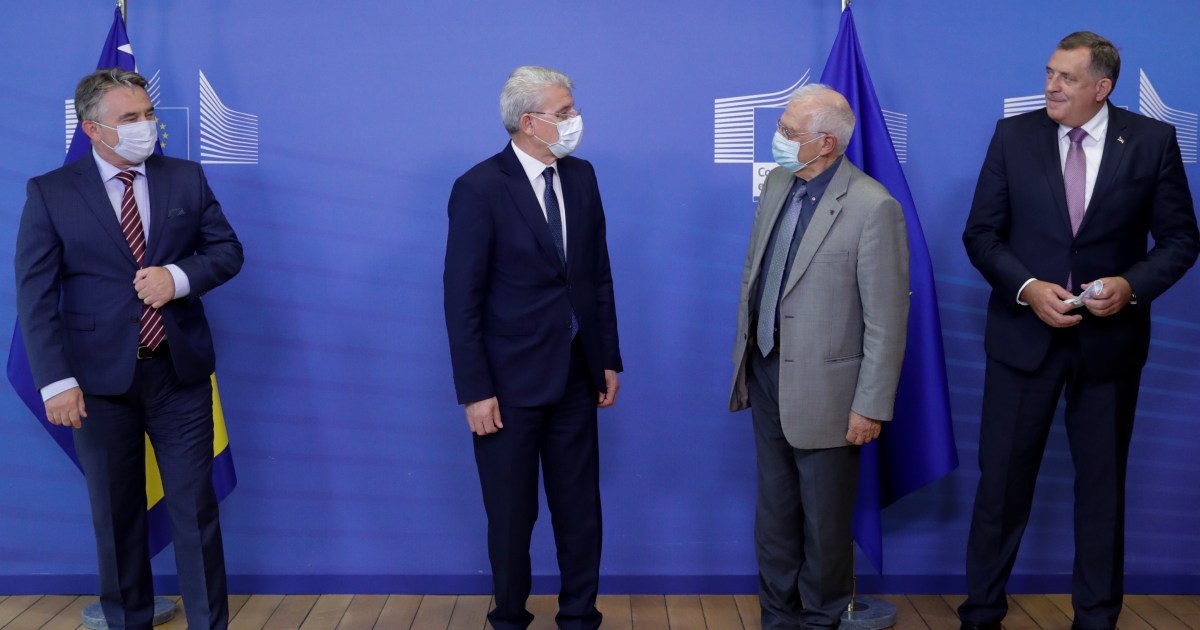After attending the inauguration of Chechen President Ramzan Kadyrov in Grozny in early October, the previous grand mufti of Bosnia, Mustafa Cerić, took to Fb to replicate on his go to. Because the chief of Bosnia’s Islamic group for nearly twenty years, he was recognized for his headline-generating proclamations, however this put up was seen as significantly controversial.
Evidently impressed by what he noticed in Grozny, Cerić famous how Russia built-in Chechnya after the Chechen wars however “Brussels didn’t and, it appears, doesn’t need to combine Bosnia into the European Union”. He went on to advise the EU management to “come right here to Grozny, in Chechnya, to see and find out how Vladimir Putin works in cooperation with Ramzan Kadyrov”.
His phrases had been seen by many as a dramatic about-face for a Muslim group chief who was recognized for his pro-Western views. In 2006, Cerić famously penned A Declaration of European Muslims emphasising the dedication of European Muslims to European values, and two years later led a Muslim delegation at a high-level assembly of Catholic and Muslim leaders on the Vatican. He additionally used to publicly emphasise the Western orientation of Bosniak Muslims together with his oft-repeated assertion: “Our sultan is in Brussels.”
Cerić’s assertion displays a rising development of Euroscepticism amongst Bosnians, who’ve historically seen EU integration as the one option to resolve all the issues of post-war Bosnia. These attitudes replicate Brussels’ personal integration fatigue and inconsistent insurance policies in direction of the Western Balkans. Nevertheless, shedding hope for EU membership could possibly be a harmful prospect for Bosnians.
Waning assist
In 2003, the EU held the Thessaloniki summit at which it promised Western Balkan international locations European integration in the event that they met sure admission standards. In 2016, Bosnia lastly utilized for EU membership and three years later, Brussels outlined 14 necessities the nation has to fulfil to ensure that the accession process to be launched, however since then the method has stalled. In early October, an EU summit in Slovenia failed to supply a transparent timetable for Bosnia’s accession to the union.
It’s by now apparent that declining assist amongst EU residents for persevering with enlargement of the union is influencing EU determination making and its willingness to proceed with integration.
These unfavourable indicators out of Brussels are inevitably affecting the Bosnian public, which is beginning to understand the mixing course of as unfair and inconsistent. In a 2020 ballot by Bosnia’s European Integration Workplace, 75 p.c of respondents stated they’re in favour of becoming a member of the EU. Simply six years earlier, this quantity was 85 p.c.
The downward development can be obvious in numerous public spheres, together with in academia, mental areas and even politics. I’ve been instructing at college degree in Sarajevo since 2014. On this capability, I used to sit down by means of a substantial variety of MA theses defences on Bosnia’s European integration course of yearly. However during the last 12 months or two, there was a marked decline in scholar curiosity in writing on or researching the EU.
I’ve seen a rising disinterest in EU politics even amongst my colleagues. Teachers who as soon as repeatedly lectured and consulted on European integration are actually reorienting their work and specializing in Russia, the far-right, and intolerant politics. Likewise, non-governmental organisations that used to give attention to EU membership have additionally moved on to different fields.
Key public figures within the political sphere have additionally seemingly misplaced their ardour for EU integration and sound increasingly disillusioned of their public statements. Reuf Bajrović, for instance, who based the Civic Alliance occasion and has advocated civic-based politics to counter ethnic politics in Bosnia, has turn into more and more vocal in his criticisms of the EU.
He, like different distinguished figures, has argued that Brussels is biased towards Bosniaks, who make up barely greater than 50 p.c of the Bosnian inhabitants, and doesn’t need to admit international locations with massive Muslim communities inside the union.
Whereas this argument was virtually unprecedented in Bosnia’s public sphere 5 to 10 years in the past, it’s now more and more accepted as a believable clarification for the EU’s inconsistent insurance policies in direction of Bosnia. Anti-Muslim sentiment in Brussels can be raised as a doable purpose behind the sluggish progress North Macedonia and Albania have made in direction of membership; Muslims represent respectively 36 p.c and 59 p.c of their populations.
Including to the rising scepticism amongst Bosnians is the notion that the EU integration failed to rework the politics of different Balkan international locations. Corruption and dysfunction proceed to plague Balkan nations which joined the union over the previous 17 years. That is difficult the conviction that the EU may resolve Bosnia’s issues.
The hazards of EU disillusionment
For Bosnia, like different Western Balkan states, the prospect of EU membership was a driving power for political reform. Now with membership an more and more distant prospect, momentum for reforms has declined.
This has inevitably affected the sway the EU has over Bosnian politics. Bosnian politicians are more and more difficult EU positions, calling the EU’s bluff and strolling away with no penalties. Take, for instance, Bosnian Serb member of the nation’s tripartite presidency, Milorad Dodik. He has been constantly undermining the Dayton Peace Accords and destabilising the nation.
In July, Valentin Inzko, the then UN Excessive Consultant who holds some government powers in Bosnia, imposed a ban on denial of the Bosnian genocide, which is widespread in Republika Srpska. In retaliation, Dodik instructed Bosnian Serb representatives in state establishments to cease their work, thereby successfully blocking their decision-making processes, as enter from all three most important ethnic teams (Bosniaks, Serbs and Croats) is required for them to perform.
Since then, he has escalated additional his violations of the peace settlement, saying his intention to arrange various establishments for Republika Srpska, thus rejecting the authority of state-level establishments. He additionally just lately declared the formation of Republika Srpska armed forces, separate from the unified Bosnian navy.
In his aggressive posturing, Dodik seems assured that the EU won’t impose sanctions on him and just lately went so far as declaring that in the event that they had been to be imposed, that might usher in “the independence day of Republika Srpska”. Bosnian politicians like him know that the EU is simply too divided to behave.
Dodik’s escalation has anxious many Bosnians, who see the institution of a Serb military as a significant step in direction of Republika Srpska’s secession and one other warfare. The strikes he’s making are harking back to these made by Bosnian Serb leaders within the fall of 1991, simply earlier than the warfare broke out.
The EU’s response to Dodik’s threats was to ship Claudio Graziano, Brussels’ high navy official, to Sarajevo the place he expressed his assist for the Bosnian armed forces. It’s clear that the EU can’t be relied upon to supply safety for Bosnia, given its ineffective response within the Nineties and the restricted presence of the European Union Power (EUFOR) within the nation, which numbers just some hundred troops.
Nevertheless, what the EU can do now could be to impose a prohibitively excessive value for any transfer that endangers the peace and safety of the nation. The EU must make a transparent stand towards separatist politics in Bosnia by imposing sanctions on Bosnian leaders that violate the Dayton Peace Accords. To make sure that sanctions are efficient, it might probably ask the USA to hitch the hassle and prolong these measures to cowl not simply politicians, but in addition their associates and companies that they personal or which can be managed by their cronies.
Bosnia additionally wants a powerful reaffirmation of its European future – one which places it clearly on a path in direction of EU membership. Because the nation utilized for EU membership in 2016, there was no momentum-generating EU determination. Now could be the time for the EU to grant Bosnia a candidate standing.
Failure to behave early and decisively may invite pernicious actors to escalate their destabilising politics. If Bosnia is pushed over the sting, it won’t be solely its folks that can endure the implications, however the entire of Europe.
The views expressed on this article are the writer’s personal and don’t essentially replicate Al Jazeera’s editorial stance.







